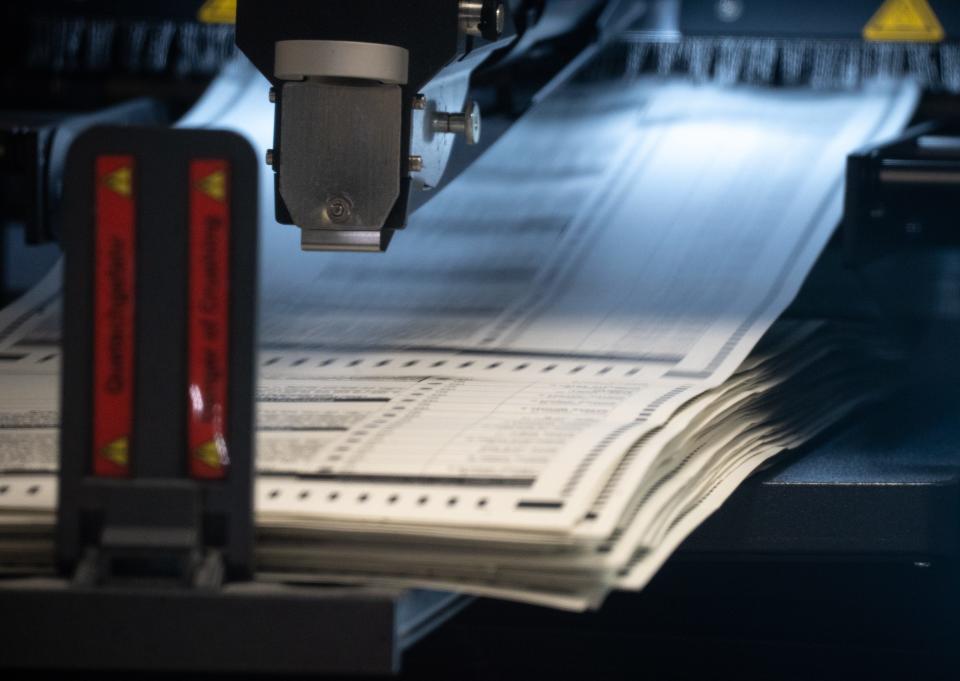New law to fix Arizona's election timeline means changes to your vote. Here's what to know
Arizona lawmakers passed legislation last week designed to ensure the state's recently widened recount margin won't disrupt this year's elections.
The fix carves out time for election officials to hit key deadlines even if races go to recounts during the upcoming state primary and general elections. Lawmakers said it will ensure military and overseas voters get their ballots for the November election on time and Arizonans' votes for president count in the national tally.
But the bipartisan election measure includes several provisions that will impact Arizonans at the polls later this year and in election cycles to come. Here's what to know.
Law changes primary date
The new statute will move the state primary forward this year to buy election officials time to deal with potential recounts.
It was initially scheduled for Aug. 6. The new law moves the election up a week to July 30.
That means other related dates will also be adjusted. The new voter registration deadline will fall on July 1 and ballots will be mailed to early voters on July 3, according to the Arizona Secretary of State's Office.
Next year's primary election will also fall on July 30, per the legislation. After that, it will revert back to the Aug. 6 date unless lawmakers take further action.
Changes for those assisting voters with disabilities
In Arizona, voters who are physically unable to mark their own ballots may be assisted by others to cast their vote.
These assistants have long been required to sign an affidavit on early ballots attesting under the penalty of perjury that they filled out the ballot as the voter instructed.
Under the new law, their signatures will also be checked by election workers in a process called signature verification.
Election officials said the full ramifications of that change weren't immediately clear. But they said it could mean voting assistants would have to be registered voters themselves.
That could pose future barriers for some voters who need assistance filling out their ballots.
A compressed period to fix missing, mismatched signatures
During the signature verification process, election workers are trained to look at specific characteristics of a signed early ballot envelope and compare them with known samples of a voter's signature.
If a ballot envelope is missing a signature or staff determine the signature on the envelope does not match previous samples, workers attempt to contact the voter to correct, or "cure," the issue.
State law currently dictates voters have five business days to cure their ballot after election day. The bill swaps that language to calendar days through 2026, meaning voters will have to move slightly faster in the next few years to fix their signature if their ballot requires curing.
The new law also mandates that county recorders and municipal clerks help voters out by staying open on the weekends immediately before and after the election.
New rules for ballots handed in on election day
Starting in 2026, the new law will change how early ballots handed in on election day are processed.
Those ballots, known as "late earlies," are currently collected from polling locations and drop boxes once voting ends on election day. Then, they must go through the signature verification process before they can be tallied.
The new statute will allow voters who filled out an early ballot to return it to a polling place on election day, show ID and have their ballot stamped as verified without needing scrutiny of the voter's signature against past samples.
That means voters dropping off their early ballots on election day could see new lines in polling places during the next midterm election cycle.

Initial results could come quicker, but close races might still take days
Lawmakers hope the new process for "late earlies" could speed up vote tallying.
The provision could help counties get more results out on election night once it takes effect. Still, voters can expect full results to take days because state law dictates a mandatory ballot curing period.
Media can call races with wide margins without knowing full tallies, but closer races may hinge on ballots stuck in the curing process.
The compressed curing period included in the legislation will slightly shorten the wait for those full results in the next few years — but not enough to get tight races called on election night. Plus, it expires in 2027 unless lawmakers take further action.
Sasha Hupka covers county government and election administration for The Arizona Republic. Do you have a tip to share on elections or voting? Reach her at [email protected]. Follow her on X, formerly Twitter: @SashaHupka. Follow her on Threads: @sashahupkasnaps.
This article originally appeared on Arizona Republic: Will Arizona's new election timeline law impact voters? What to know
